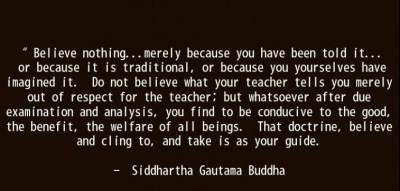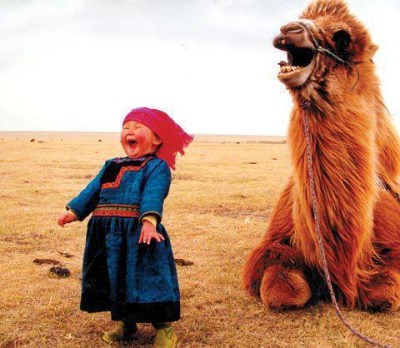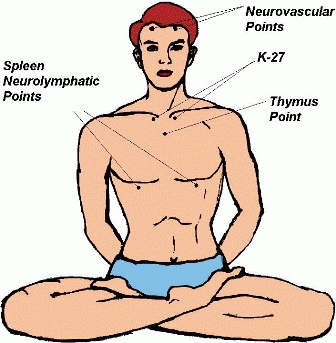2. Real Buddhists don't worship idols...
Early "images"/sculptures of the Buddha were empty of him... actual images of Siddhratha as "The Buddha" emerged in later centuries The "throne" is empty because according to Siddhartha "The Self" didn't exist, it was your own creation.
The Nature Of The "Self"
Note: The ancient idea of the world/universe as an 'illusion' has re-emerged in modern physics as the idea of the world and universe as a hologram from string theory (approx 5 minutes into following video)...
To put it in other words; you are not the person you were a year ago. You know this. You can probably see the ways in which you’ve changed and grown over the last year. You probably see the world in a different way then you did a year ago (or ten years ago). Since you see the world differently, you have a different image of yourself as well. You define yourself differently than you did 10 years ago. What you are capable of, what you can do, who you are, all these definitions tend to change for every person - given enough time. The ancient philosophers noticed that as soon as you imagine a event happening to you - or your role in any situation - you first have to place yourself in it (i.e. you have to imagine your role or character) then you decide what to do or how to feel (this all tends to happen very fast for most events). In other words, every time you imagine yourself or a situation that you are in you are, in a sense, recreating yourself.
Scientific American Mind magazine in an interview with the Nobel laureate Neuroscientist Eric Kandel (click here to read article)
Mind: We tend to think of memory as a kind of library that holds a record of events and facts that can be retrieved as needed. Is this an accurate metaphor? Kandel: No, memory is not like that at all. Human memory reinvents itself all the time. Every time you remember something, you modify it a little bit, in part dependent on the context in which you recall it. That is because the brain’s storage is not as exact as written text. It is always a mixture of many facades of the past event: images, pictures, feelings, words, facts and fiction—a “re-collection” in the true sense.Modern nuero-science agrees with the Buddhist idea of an impermanent self. As Eric Kandel points out that, “Every time you remember something, you modify it a little bit, in part dependent on the context in which you recall it.”
In other words you recreate your image of yourself to fit the new situation. If the self was something permanent and real, then your image of yourself would always remain the same. The fact that you can consciously or unconsciously change your image of yourself and react to situations in a new way - or just create a new you - proves that the self is something you make up as part of living in society. What does this mean? This means that you are not limited to being any particular ’self’ or person. If you feel like you have low self-esteem you can change that self. If you feel like you are not comfortable is social situations, you can change that image too. Any limiting image you have of yourself can be changed as you create your 'self' or how you want to be.
The Dalai Lama is supposed to be 'an incarnation of compassion' and is essentially a Buddhist Monk which he has claimed on TV as well. Buddhism & the Dalai Lama are subject to changing thier minds as science advances to fit thier practices in accordance with modern knowledge. I'm pretty sure I can prove through physics that reincarnation doesn't exist. But this is a blog post for another time.
I'm Buddhist NOT Tibetan. I discovered Buddhism (and chi kung) through my studies. The middle path is illustrated in Rumi's Mathnawi which are still books that I learn from and they have stories I use. Rumi's Mathnawi is available in the public domain (i.e. free for anyone to download)...
Rumi's Mathnawi Books 1 & 2
Rumi's Mathnawi Books 3 & 4
Rumi's Mathnawi Books 5 & 6
Note that Rumi teaches what was, essentially, taught by Jesus...
Matthew 36 “Teacher, which is the greatest commandment in the Law?” 37 Jesus replied: “‘Love the Lord your God with all your heart and with all your soul and with all your mind.’ 38 This is the first and greatest commandment. 39 And the second is like it: ‘Love your neighbor as yourself.’ 40 All the Law and the Prophets hang on these two commandments.
For the psychology of balance or 'the middle path' today, you don't have to look much farther than the Dalai Lama who is not only an expert but is also a leader...
“If a problem is fixable, if a situation is such that you can do something about it, then there is no need to worry. If it's not fixable, then there is no help in worrying. There is no benefit in worrying whatsoever.” ― Dalai Lama
“Be empty of worrying. Think of who created thought! Why do you stay in prison When the door is so wide open?” ― Rumi, The Essential Rumi
The Buddhist psychology that the Dalai Lama has expressed thus far has been in line with what I know of psychology studied Carl Jung and meditational techniques so I consider him to be an expert on Buddhist Psychology for our age.
Every culture and religion has its sayings and aphorisms that help thier people related to thier environment. One aspect of these teachings are 'the psychology of balance' or 'the middle path'. A path explained by Siddhartha and was obviously held in very high esteem by the Ancient ascetics and mystics. Though asceticism by it's very nature tends to be polaristic, the meditation of the yogis (and of Siddhartha) was obviously being followed by the early Christian Desert Fathers and some of the Ancient Jewish prophets {or mystics i.e. read the Kabbalah... or don't (if you're Jewish as it's not allowed till you're 40.)}.If you do want to go into the Kabblah you could start with the Zohar (which was probably written by Ibn Arabi. Many of the scholars of those ages could speak in more than one symbolic language).
In Islam there is a Hadith (which I can't find right now) along the lines of 'The Prophet (P.B.U.H) heard Hazrat Umar and Hazrat Abu Bakr reciting the Holy Quran. He asked Umar why he was reciting the Quran so load and he replied to chase away the devil. He then asked Abu Bakr was he was reciting the Holy Quran so softly (forgot the reply)'. Finally, Mohammed (P.B.U.H) said something along the lines of 'do not read the Quran too loud or too softly. Follow the middle path.' {BTW, Mohammed (P.B.U.H) was also well known for spending days meditating in his cave. Meditation was big in the Deserts of the middle east.}
Note: "The Middle Path" means NOT to go to one extreme or another. Not too hot or too cold. Don't get too happy or too angry. Always stay in the middle or roughly in the middle.
Buddhism As A Philosophy...
"Naturally, every age thinks that all ages before it were prejudiced, and today we think this more than ever and are just as wrong as all previous ages that thought so. How often have we not seen the truth condemned! It is sad but unfortunately true that man learns nothing from history." - Carl Jung
Synopsis: Stephen Batchelor defines “Awakening” as awareness of yourself and your surroundings that expands over time with disciplined practice. He rewrites the Buddhist creed of "Life IS Suffering" and the "Cause of suffering IS craving" to "Anguish is to be understood, its origins to be let go of, its cessation to be realized, and the path to be cultivated."
In doing this he changes the perspective of Buddhism from believing that life itself is only about suffering to the idea that it is your mind and its incessant desires are the reason for this suffering. This effectively changes the emphasis from something beyond your control to something within your control. That is the difference between Buddhism as a philosophy and Buddhism as a religion.
One of his students asked Buddha, "Are you the messiah?"
"No", answered Buddha.
"Then are you a healer?"
"No", Buddha replied.
"Then are you a teacher?" the student persisted.
"No, I am not a teacher."
"Then what are you?" asked the student, exasperated.
"I am awake", Buddha replied.
The first written records of Siddhartha (Later called the Buddha) come from Siri Lanka (an island off the coast of South India), several hundred miles from where he taught. Like many other figures of mythology, his teachings were first written down well after his death, about 300 years later, so the reality of his teachings were already well mixed with local religious ideas and mythology.
I like this book because the author separates the meditational philosophy of balance/awakening from the religious beliefs.
This makes the practice of awareness/awakening something that a person of any religious persuasion can learn and apply.
For example, Siddhartha basically taught that,
"Anguish is to be understood, its origins to be let go of, its cessation to be realized, and the path to be cultivated."
Or in other words, the root of anguish is desiring life to something other than it is. Accepting life as it is helps release anguish.
When this becomes, "Life IS Suffering" and the "Cause of suffering IS craving" then the philosophy of cultivating awareness becomes a belief system to be followed. This is where Buddhism becomes a religion.
During Siddhartha's lifetime many people were able to attain awareness and "awakening" but after his death it became something to be strived for and rarely, if ever, achieved. Why has it become so hard to attain awakening? Because turning
Buddhism into a religion made it's tenants "Holy", something well above ordinary reality. So following the teachings as a practice of expanding awareness switched to one of devotion.
The Buddhists explain this lack of "enlightenment" in modern religious Buddhism as an example of the degradation of humanity over time. That is the common excuse for any religious person to explain why the tenets of their religion are NOT followed in society AND can never be followed until 'the end days'. This effectively removes moral responsibility for their actions as a society, as it is not the practitioners fault but life itself that makes enlightenment/awakening/peace impossible.
"An unawakened existence, in which we drift unaware on a surge of habitual impulses, is both ignoble and undignified. Instead of a natural and non-coercive authority, we impose our will on others either through manipulation and intimidation or by appealing to the opinions of those more powerful than ourselves. Authority becomes a question of force rather than integrity."
Living for momentary pleasures makes a person jump from one thing to another rarely finding complete satisfaction in one thing - always looking for the next ‘high’. This high can be social company, excessive exercise, drinking, drugs (both illegal and legal ones) etc. Letting go of craving can free us, even if it is only momentarily. That is why the path must be cultivated.
Experiment
Sit comfortable and consciously relax all the muscles in your body. Begin from your scalp and work your way down to your toes. Now become aware of your breath and as you maintain the focus on your breathing ALSO become aware of the surface you are sitting on, the cloths on your body, your surroundings and even the dome of the sky stretching off to the horizon. Be aware of your breathing and all of the above simultaneously.
If you can do the above only for a few seconds that is fine. You just have experienced 'expanded awareness'. Many people who try this will recognize the awareness they are experiencing from a previous experience. Yes, humans are 'mystical' creatures. Awakening, no matter how much it is avoided, is intrinsically a part of everyone AND is something that ANYONE can learn.
As a global culture we fix ourselves in 'palaces' of what is familiar and secure. We sense there is more to life than trying to gratify our desires and defend ourselves from fear. Yet we don’t know how to get their and this leads to even more activities of distraction.
For Example; We all know that the only certainty in life is death. If we keep the inevitability of death on our minds many things we worry about will no longer matter. Instead we try to avoid that thought at all costs to the point where when we encounter death we are shocked and terrified and say, 'his/her time came early'. There is no such thing. Without the perspective of our death how can we possibly make short or long term decisions that aren’t influenced by drowning ourselves in momentary pleasures?
"Since no one knows the future,
who can tell him what is to come?
No man has power over his spirit to retain it,
so no one has power over the day of his death."
Ecclesiastes 8:7-8:8
Death is always there waiting for you, every day of your life. It is sad, depressing, part of the sorrow of life, but it is not 'early'.
What is life? It is the flash of a firefly in the night. It is the breath of a buffalo in the wintertime. It is the little shadow which runs across the grass and loses itself in the sunset. - Blackfoot
Since death is certain, avoiding it makes you avoid life itself.
Think about it. How do you know that someone is alive? By the simple fact that he/she is not dead. In other words, death defines life. Without death we would not know what life is. So by avoiding the acceptance of death we become escapists of life itself. Chasing momentary pleasures to cloud our awareness and our fears.
If you are constantly making life to be some perfect image to be attained at some point in the future, you will ALWAYS be chasing that image. If you cannot be content now you will never be content as there will always be something else you 'need' before you can be happy. A bigger car, a bigger house, a plane? This will give a rush of excitement followed by boredom with your new toy and craving for the next one.
This doesn't mean you shouldn't enjoy expensive things just that you should be happy first or nothing you get will ever satisfy you. (“Be bountiful and multiply”)
If you jump from one emotion to another, blindly avoiding pain and seeking pleasure with no awareness or separation from your emotions THEN your emotions will control you. You will be a slave to your desire. Anyone who knows your desires can control you.
"All man's efforts are for his mouth,
yet his appetite is never satisfied."
Ecclesiastes 6:7
According to this book, the first step out: Become aware of every emotion you have as you experience it. Don't try to stop the emotion but learn to distance yourself from it, pain, sorrow or joy. Keep a part of yourself that is always observing yourself and your emotions.
By these definitions awakening is a process of building and maintaining the discipline of awareness.
Laziness brings on deep sleep,
And the shiftless man goes hungry.
Proverbs 19:15
"The wise man has eyes in his head,
while the fool walks in the darkness."
Ecclesiastes 6:7
Psychological Problems of "True believers"...
This is from the preface of his book, The True Believer;
"All mass movements generate in their adherents a readiness to die and a proclivity for united action; all of them, irrespective of the doctrine they preach and the program they project, breed fanaticism, enthusiasm, fervent hope, hatred and intolerance; all of them are capable of releasing a powerful flow of activity in certain departments of life; all of them demand blind faith and single hearted allegiance."
To start a fundamentalist religious group (or a non-religious one) blind obedience without question is necessary. If people are educated with history and the sciences in a way where it becomes integrated with their perception then lying to them becomes very difficult. If someone with religious authority lies to them, it will hurt to have someone they like lying to them but they will do what is right...eventually, once they are sure.
"The ideal devil is a foreigner. Hitler—the foremost authority on devils—found it easy to brand the German Jews as foreigners." (pp. 92-93)
Given the history of America and Britain in the region painting the west as 'the devil' is an easy thing to do. What was astonishing that the educated west did the exact same thing! Fundamentalists there use evidence out of context to turn all Muslims into the equivalent of 'devils'! [These Christian fundamentalists are an important constituent of the Republican Party]
In the same way the Muslim world was painted as 'the devil' during the crusades (started by the Pope for territorial reasons). Hatred becomes a habit. (p. 146) It takes roughly 21-30 days for the brain to build the neural processes to form a habit (depending on the intensity of the installation). If you hate someone and attack them (for example, through slander) then that behavior becomes a habit. A fundamentalist group, claiming to be from ANY religion, has developed a habit for hate and thus has lost all reason.(or at least will ignore reason unless the evidence is simply overwhelming and can’t be avoided)
The following extract is from the book "The True Believer: Thoughts on the Nature of Mass Movements" and is meant to illustrate why people become some emotionally involved in a mass movement or political party, without any ability - or even care for - rationality and reason;
8. Faith in a holy cause is to a considerable extent a substitute for the lost faith in ourselves.
9. The less justified a man is in claiming excellence for his own self, the more ready is he to claim all excellence for his nation, his religion, his race or his holy cause.
10. A man is likely to mind his own business when it is worth minding. When it is not, he takes his mind off his own meaningless affairs by minding other people's business.
This minding of other people's business expresses itself in gossip, snooping and meddling, and also in feverish interest in communal, national and racial affairs. In running away from ourselves we either fall on our neighbor's shoulder or fly at his throat.
11. The burning conviction that we have a holy duty toward others is often a way of attaching our drowning selves to a passing raft. What looks like giving a hand is often a holding on for dear life. Take away our holy duties and you leave our lives puny and meaningless. There is no doubt that in exchanging a self-centered for a selfless life we gain enormously in self-esteem. The vanity of the selfless, everi those who practice utmost humility, is boundless.
12. One of the most potent attractions of a mass movement is its offering of a substitute for individual hope. This attraction is particularly effective in a society imbued with the idea of progress. For in the conception of progress, "tomorrow" looms large, and the frustration resulting from having nothing to look forward to is the more poignant. Hermann Rauschning says of pre-Hitlerian Germany that "The feeling of having come to the end of all things was one of the worst troubles we endured after that lost war."-' In a modern society people can live without hope only when kept dazed and out of breath by incessant hustling. The despair brought by unemployment comes not only from the threat of destitution, but from the sudden view of a vast nothingness ahead. The unemployed are more likely to follow the peddlers of hope than the handers-out of relief.
Mass movements are usually accused of doping their followers with hope of the future while cheating them of the enjoyment of the present. Yet to the frustrated the present is irremediably spoiled. Comforts and pleasures cannot make it whole. No real content or comfort can ever arise in their minds but from hope.
13. When our individual interests and prospects do not seem worth living for, we are in desperate need of something apart from us to live for. All forms of dedication, devotion, loyalty and self-surrender are in essence a desperate clinging to something which might give worth and meaning to our futile, spoiled lives. Hence the embracing of a substitute will necessarily be passionate and extreme. We can have qualified confidence in ourselves, but the faith we have in our nation, religion, race or holy cause has to be extravagant and uncompromising. A substitute embraced in moderation cannot supplant and efface the self we want to forget. We cannot be sure that we have something worth living for unless we are ready to die for it. This readiness to die is evidence to ourselves and others that what we had to take as a substitute for an irrevocably missed or spoiled first choice is indeed the best there ever was.
It would help to develop empathy to fulfill the Golden Rule.
“Happiness is not something ready made. It comes from your own actions.” ― Dalai Lama
Edelman sums up the practical advice that emerges in seven words: "When fishing for happiness, catch and release".




 RSS Feed
RSS Feed
